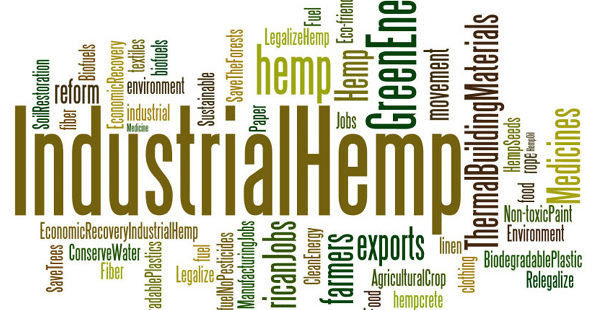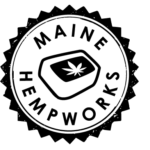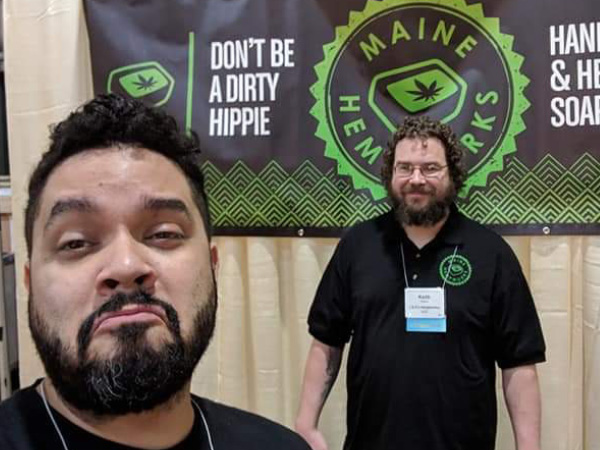
The Devil’s Lettuce, KGB, Mary Jane, MJ, Cheeba, Ganja, Left-Handed Cigarette, Kind, Endo, Sinsemilla, Wacky Tabacky, Reefer, Pot, Weed, Marijuana, Hemp, these are just a sampling of names cannabis goes by, but what is it really?
Without getting too heavily into the science, the species that most people think of when thinking of cannabis is Cannabis Sativa. There are several different types of cannabis, some with high levels of tetrahydrocannabinol (THC), some which are more fibrous and have higher levels of cannabidiol (CBD), others with an intermediate between the two, a variety with high levels of cannabigerol (CBG), and lastly one almost without cannabinoids. It’s this last one, that we use the most at Maine Hempworks, this is industrial cannabis. To legally be classified as industrial cannabis, the plant can only contain below 0.3% THC and CBD. This is in contrast to medical or recreational use cannabis which is anywhere between 2-30%. However, the Farm Bill of 2018 has allowed plants high in CBD to be included with what was traditionally classified as ‘Industrial Hemp’, and the FDA is still trying to figure out regulations for CBD in terms of its inclusion in food products and its medicinal uses.
 Industrial cannabis presents a great opportunity for the State of Maine. It will help farmers to increase their ability to make money because hemp doesn’t require large amounts of land to grow. It will also help improve the soil if used as a rotation crop. Cannabis has been known to help clean the soil of toxins, and has been planted at Chernobyl for this very reason! That being said if cannabis is being used as a means of soil clean-up it would only be good to be used as fuel afterward as it would be too contaminated for human use. Aside from its use as a rotational crop, this plant has the potential to bring Maine’s manufacturing roaring back to its pre-1980’s form! The amount of products that can be produced with industrial cannabis is vast and will need employees, facilities and entrepreneurs that have a vision for what cannabis can do for not just the state, but the world.
Industrial cannabis presents a great opportunity for the State of Maine. It will help farmers to increase their ability to make money because hemp doesn’t require large amounts of land to grow. It will also help improve the soil if used as a rotation crop. Cannabis has been known to help clean the soil of toxins, and has been planted at Chernobyl for this very reason! That being said if cannabis is being used as a means of soil clean-up it would only be good to be used as fuel afterward as it would be too contaminated for human use. Aside from its use as a rotational crop, this plant has the potential to bring Maine’s manufacturing roaring back to its pre-1980’s form! The amount of products that can be produced with industrial cannabis is vast and will need employees, facilities and entrepreneurs that have a vision for what cannabis can do for not just the state, but the world.
So, what are some of the ‘vast number’ of products that can be made with cannabis? I’m sure some are familiar to you; paper, rope, clothes, as well as body care products, but there are many more applications for the plant and oil besides these. Here are just some of the products that can be made from cannabis:
- Food: hemp hearts, hemp milk, dressings, salad, granola, juice, protein powder. Hemp is high in fatty omega acids and is very healthy for you and is considered a complete protein.
- Fiber: rope, clothing, shoes, building material such as hempcrete, fiberboard and hempwood, as well as plastics and composites, most of the interior paneling for modern vehicles is made with hemp (BMW pioneered hemp’s use in it’s i3 door panels)
- Biofuel: seed oil can be turned into fuel and the shiv of the stalk can be turned into pellets for heating your home, these pellets are equivalent to premium grade wood pellets.
As you can see cannabis isn’t just a plant that gets you high. The answer to ‘What is Cannabis?’ can vary from person to person. Overall, cannabis in all its varieties is a plant that has many beneficial features and can help create a lot of jobs in Maine. For an example that Maine could follow, Kentucky is one of the best in the country. Kentucky is far ahead of the rest of the country when it comes to industrial hemp – they were the last state to stop growing it, 1958 was the last significant hemp crop but during the 19th and 20th centuries they were producing 3⁄4 of the US hemp fiber, about 52,000 acres at its peak – and the first to bring it back with 33 acres in 2014. Kentucky’s passion for bringing industrial hemp back to the state was so strong, they sued the DEA, in 2014, for confiscating a large amount of their industrial hemp seed. After winning their case they’ve proceeded with reviving the hemp industry in their state. The Kentucky Department of Agriculture has approved 1,035 applications to cultivate up to 42,086 acres of industrial hemp in 2019. They know the benefits of cannabis and what it means to their citizens, it’s time for Maine to catch up!

Keith Pillsbury and Joseph Weeks are the entrepreneurial minds behind Maine Hempworks – where they focus on handcrafted; hemp-based personal care products and hope to inform and educate the public about the wonders of hemp!






